
This past summer, the City of Tigard completed improvements to Burnham Street, one component of their downtown core.
Now they’re finalizing plans for Main Street (located along Highway 99, 10 miles south of downtown Portland), and by the summer of 2013 we’ll see improvements making it easier and safer to ride a bicycle in the area, including improved connections to the Fanno Creek Trail.
I recently met up with Jeff Peck, Senior Engineering Technician for the City of Tigard, to review highlights of the Main Street project.
One of the first things on my mind were sharrows. The city installed some on Burnham street, but only two in less-than-ideal locations, far from intersections and conflict areas where they could be most beneficial.

“plastered” with sharrows.
Peck reassured me that there will be many more installed during the upcoming project, going so far as to say that Main Street will be “plastered” with sharrows.
Along with sharrows, people on bicycles will be able to enjoy a bicycle lane as they approach Highway 99 at Main Street’s west end. The lane will be positioned to the left of the right-turn lane and facilitate bicycle traffic to the current connection with the Fanno Creek Trail on the north side of Highway 99, on SW Johnson Street.
An eye-shaped island will also be installed near Main Street’s west end, with a crosswalk and mid-street refuge for pedestrians traveling to and from businesses and apartments.
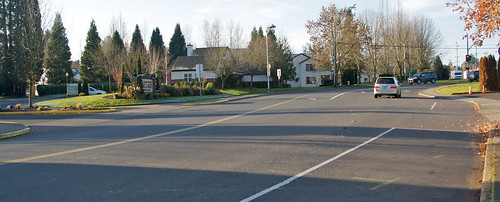

at the west end of Main Street.
Additional improvements to connections with the Fanno Creek Trail will include a new crosswalk where the trail intersects Main Street and raised crosswalks at the intersection of Main Street and Tigard Street.
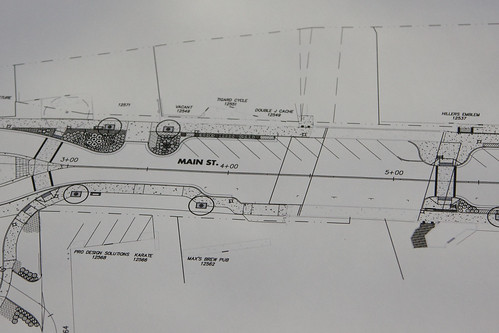
at the intersection of Main Street and the Fanno Creek Trail.
Although the Fanno Creek Trail does not connect to Tigard Street at the moment, there are plans to extend the trail to that street sometime after Main Street’s renovations are completed. The connection will eventually allow people using the trail to pass under Highway 99, instead of crossing the highway at Main Street’s west end.
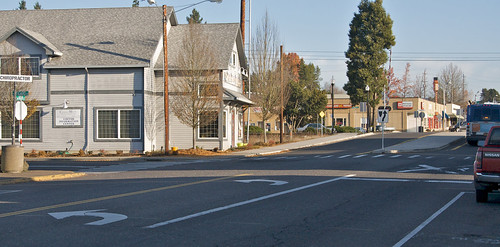
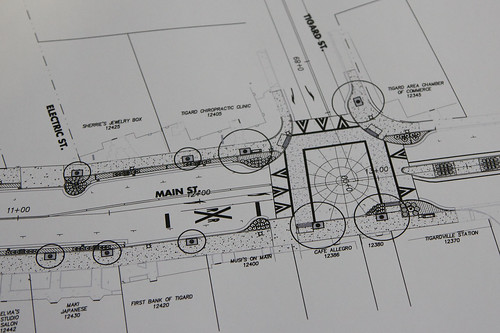
the corner of Main Street and Tigard Street.
(The black triangles in the crosswalks indicate a grade change.)
Both Peck and Kim McMillan, Engineering Manager for the City, explained that the improvements for bicycles and pedestrians are a tool being used to improve the atmosphere for businesses on Main Street.
Along with improvements for pedestrian and bicycle traffic, the city is installing benches, street trees, and planters on light poles and next to sidewalks to increase the desirability of property on the street. Construction during the next two years will be scheduled at night, when possible, to minimize the inconvenience to existing businesses.
Peck said his personal goal for the area is for business owners to see property in downtown and think, “I can do something with this!”
Construction is expected to take place in the summer of 2013. Between now and then, Peck described the only significant hurdle remaining as “minor property acquisition” which needs to be finalized.
I was initially concerned to hear his comment. Sometimes when enough space can’t be obtained for a project like this, facilities for bicycles are squeezed out in favor of motor vehicle access.
McMillan went on to say, though, that plans for on-street facilities have changed very little in the later phases of the project and she expects little to no change between now and the start of construction.
I’ll be keeping an eye on the developments along Main Street and will share more when the construction begins.
What do you think of the changes to Main Street? Do you think the planned improvements will make it easier for you to use the Fanno Creek Trail?
— Read more coverage of Washington County here.



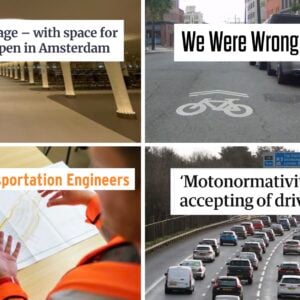
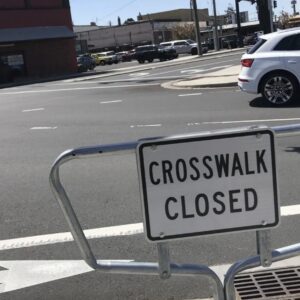
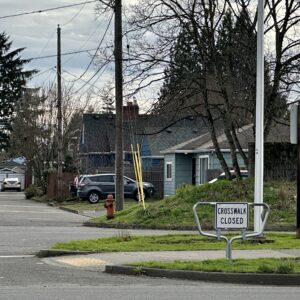
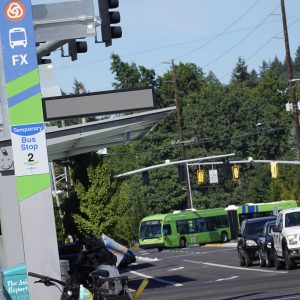
Thanks for reading.
BikePortland has served this community with independent community journalism since 2005. We rely on subscriptions from readers like you to survive. Your financial support is vital in keeping this valuable resource alive and well.
Please subscribe today to strengthen and expand our work.
What is with the regional obsession with speed humps, when those tend to be substantially less effective, presents a greater hazard and costs more to maintain than a traffic choke, chicane or twisted chicane?
Especially since those street legal monster trucks called SUVs fly over those things as if they’re not there.
Heck, a sedan with good suspension won’t slow down for ’em either. Commercial vehicles rarely do, and given the ground type we have here, when they strike a speed bump, it makes the whole block shake.
For the money, speed humps are great.
Not anywhere near as much as a twisted choke would, and the twisted choke would be cheaper without presenting a hazard to two-wheeled vehicles.
I’ve never been a huge fan of speed humps, but over time I’ve become convinced that they are actually the only guaranteed way to slow all motorists down.
But they only slow down vehicles whose suspension can’t take it. On a bicycle, you might as well be hitting a curb.
Both the raised crosswalks and nearby speed humps don’t slow me down at all on a bike, even if I’m hammering. I tend to catch up to cars at them.
Speed bumps are a different matter…much more curb-like.
There are both raised sidewalks and a chicane (mid-street island) on a street I ride frequently; speed limit is 30mph, typical speeds are 30-35. About 80% of vehicles cut the corners in and out of the chicane, crossing into the bike lane without slowing. The paint is badly worn from that. Nearly all vehicles slow to about 15-20mph for the raised cross walks. Just my experience; don’t know why it’s different than Peter Partington’s, although he’s in the UK.
should say “raised CROSSwalks”…
Sounds like a poorly designed chicane if they didn’t put bollards on the lane lines.
I don’t like it, but there are many like it around town. I would much prefer they’d put in a third raised crosswalk at that location.
Burnham is horrible. Way to much space given to parking that isn’t utilized. The result is a wide open street that does nothing to calm traffic.
As for Main St., I don’t see how any improvements can be made as long as it is a cut through for people avoiding 99-W. Drivers that choose to cut through are already rushing and the presence of anything to slow them down (bikes, children, stop signs) is met with hostility.
I always wondered why main wasn’t one-way, westbound only, to prevent it’s use as a shortcut around traffic.
At this point Burnham is aspirational. The street is better than its surrounding land use. Once the auto repair shops, storage facilities, and other light industrial businesses are replaced by housing, retail, and restaurants, you’ll see more people using those parking spaces. It will take time for the land to take over, of course, but it is good that the street bones are in place to help facilitate it.
Main Street is now much more narrow which encourages drivers to slow down. It also has a few more street trees.
Burnham is better than it was.
No more patch work of asphalt.
I ride it 3-4 times a week.
Was very happy when it opened back up.
Much better than Commercial and dealing with the buses.
Yes, it’s MUCH better than it was. Although some of the new street markings are less than ideal it’s still a low volume street with smooth pavement. The old road was so fractured that one time, while riding on Burnham, components (a light and a bell) fell off of my bike.
And, at least in my experience on Burnham, people driving cars have been very mindful of me and my bicycle.
It definitely is much better than it was.
As a car driver, I don’t drive the 30mph speed limit (I asked the city to keep it at 20 like it was throughout construction, they said no)– I drive 25 or less, especially as it got darker earlier.
And I keep a sharp eye out for bikes and peds, and use extra caution. I hope I’m setting an example for the other car drivers– I’ve seen a lot of other people driving similarly so maybe others are having the same ideas that I have.
I haven’t been through there during the day so can’t speak to how the parking is used during daytime hours, but during the commutes those spots are mostly empty.
Thanks for driving safely in downtown! During the day the diagonal spaces get a fare amount of use and I think they help, somewhat, with traffic calming. Most cars I see slow down as they pass because they need to watch for people backing out.
Bicycling has made me a better driver. It’s good for bicyclists to get back in the car once in awhile and “be the change they want to see”. Motorists need better examples among the car and driver herd, just like they need to see and experience the positives of bicycling.
All they need now is a share the road program, seems its a hard thing to balance these days with cars and peds.
While they are looking at Tigard, they should look at Hall Blvd. In my conversations with folks in Tigard they are looking first at the short, in town routes, without looking at the bigger picture of regional connectivity.
There are some great bits of infrastructure with a few weak links connecting Tualatin to SW Portland via Tigard. I regularly ride across the bike pedestrian bridge in Tualatin (great), then navigate narrow MUPs (not so good), then pick up Hall (good and bad), Oleson (good), and Multnomah (mostly good).
Specific opportunities for improvement:
Hall at Burnham: Between Burnham and the driveway to City Hall, the southbound bike lane is too narrow and the northbound bike lane is too wide.
Hall south of 99W: Stormwater intakes are not quite at grade and take up much of the southbound bike lane.
Hall north of 99W: Several minor problems. Mailboxes and stuff encroach on bike lane. Rough pavement. Bridges have 4 inch high bumps. Dirty bike lanes.
I think this is an excellent opportunity to identify a regional bike transportation corridor and invite multiple jurisdictions to do a few relatively inexpensive coordinated actions to make medium-to-long distance suburban cycling safer and more attractive to potential commuters.
I agree with your assessment of Hall Blvd, Jim. It could certainly use some improvement; in fact, the south-bound bike lane near Burnham has faded away completely in some sections!
Keep in mind though that Main Street is managed by the City of Tigard where as Hall Blvd is an ODOT road. Different agency, different staff members, different planning processes, different budgets, etc, etc.
ODOT owns Hall, which makes it tough for anything significant to change. They’d love to give the road to Tigard but the city doesn’t want to take on the costs associated with such a high volume traffic road.
Not all of hall, just south of Canyon. It’s part of State Route 141.
Yup, the parts of Hall that need the work the most are owned by ODOT, not CoT. Which is a pity, I think the City would move faster on fixing the gaps in sidewalks and bike lanes than ODOT does.
I’d love to see them fix up that hidden trail section under the viaduct between Tigard Cycle & Ski and George Morlan Plumbing. (Hint Hint)
The thing about sharrows is, the Tigard crews hate putting them in because it is hard work to do so. It basically is a sign baked into the road surface.
I asked for sharrows to be put in on Tiedeman where they took out the bike lane to give that space over for parking, and was told “maybe”. Instead we got a sign, which is better than nothing.
The sharrows on Burnham are incorrectly placed– possibly even illegally so as the MUTCD says sharrows should be placed immediately after intersections and every 250 feet. Clearly, on Burnham, they are not.
A lower speed limit for Burnham would also be appropriate.
All that said– Tigard is starting to move in the right direction– I urge people interested in making their bikey voices heard to email Mike McCarthy and/or Basil Christopher with your bike and pedestrian concerns.
Jim Hook, Kristen, Will Vanlue…
Washington County’s Department of Land Use and Transportation is in the initial phase of the Bicycle and Pedestrian Improvement Prioritization Plan.
Tonight, December 15th, 5:30-7:30 at Billy’s Bar, 13095 SW Canyon Rd., the WTA and BTA are sponsoring a mark up on a large map of the existing pedestrian and bicycle infrastructure in WashCo.
This meeting will provide WashCo LUT with information they will use in growing the county’s Active Transportation corridors.
The Improvement Prioritization Plan stems from the county’s suspicion that Active Transportation commuters like Jim Hook are not being serviced by concepts such as the Intertwine, or MUPs in general.
I think Kristen is correct that Tigard is starting to move in the right direction. However, Tigard, like Beaverton, like THPRD, have an unrealistic notion that paths or trails are where cyclists want to travel. It is not unreasonable that we have an Active Transportation corridor system based on roads.
BIKE WALK VOTE